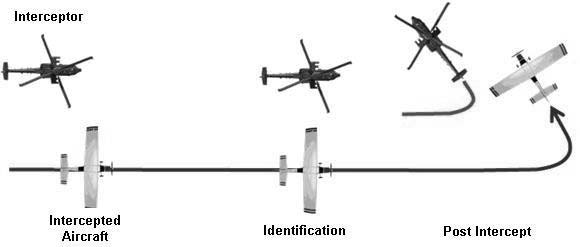Index
412
-- Page 413 --
414
12/10/15 AIM
c. Helicopter Intercept phases (See FIG 5-6-2) 3. Post Intercept Phase.
Visual signaling devices may be used in an attempt to
1. Approach Phase. communicate with the intercepted aircraft. Visual
Aircraft intercepted by helicopter may be approached signaling devices may include, but are not limited to,
from any direction, although the helicopter should LED scrolling signboards or blue flashing lights. If
close for identification and signaling from behind. compliance is not attained through the use of radios
Generally, the helicopter will approach off the left or signaling devices, standard ICAO intercept signals
side of the intercepted aircraft. Safe separation (Table 5-6-1) may be employed. In order to maintain
between the helicopter and the unidentified aircraft safe aircraft separation, it is incumbent upon the pilot
will be maintained at all times. of the intercepted aircraft not to fall into a trail
position (directly behind the helicopter) if instructed
2. Identification Phase. to follow the helicopter. This is because the helicopter
The helicopter will initiate a controlled closure pilot may lose visual contact with the intercepted
toward the aircraft of interest, holding at a distance no aircraft.
closer than deemed necessary to establish positive NOTE-
identification and gather the necessary information. Intercepted aircraft must not follow directly behind the
The intercepted pilot should expect the interceptor helicopter thereby allowing the helicopter pilot to maintain
helicopter to take a position off his left wing slightly visual contact with the intercepted aircraft and ensuring
forward of abeam. safe separation is maintained.
FIG 5-6-2
Helicopter Intercept Procedures
National Security and Interception Procedures 5-6-5
 FIG 5-6-2
Helicopter Intercept Procedures
National Security and Interception Procedures 5-6-5
FIG 5-6-2
Helicopter Intercept Procedures
National Security and Interception Procedures 5-6-5